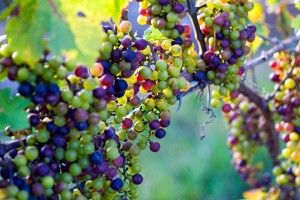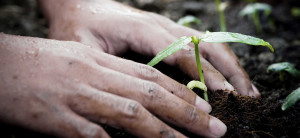Investing in Our Future: Eshet Chayil (Part 20)
By Sara Esther Crispe: February 17, 2016: Category Decoding the Tradition, Inspirations
Zamemma sadeh v’tikachehu, m’prei chapeha natah karem
“She considers a field and buys it; with the fruit of her palms she plants a vineyard.”
 We live in a world of instant gratification. We snapchat in 10 seconds or less. We tweet in 140 characters or less. Faster is better. Less is more. Anything that takes time and patience is simply not worth it.
We live in a world of instant gratification. We snapchat in 10 seconds or less. We tweet in 140 characters or less. Faster is better. Less is more. Anything that takes time and patience is simply not worth it.
And yet while the gratification may be instant, it is over in an instant as well. If we want something to last, it requires an investment.
Investments requires time to bear fruit, and consideration to know what is truly worth investing in. For when something is purchased, it becomes ours. We own it. So we want to make sure we want it for the long term.
This verse of Eshet Chayil speaks of the woman who considers a field and then buys it, and continues with her planting a vineyard. Firstly, notice it is the woman who is the one about to make this investment or business deal. There is no mention of a man here. This is important to note as often misinterpretations of this text point to the woman being in the house and only focused on household tasks. But this verse is one of the many that strongly focus on her business acumen and both responsibility and ability in determining what will benefit her family in the long term.
The verse begins with the mention of a field. A field represents an open space that has the ability to grow and develop, based on what is planted within and how it is cared for. But there is also so much that one has no control over. The weather. The amount of rain. Animals that could come and destroy the crop. Parasites. We can choose what we plant, we cannot chose what we will yield. For that we rely on faith and trust.
The field will ideally produce food which will sustain the family. Corn, wheat, barley, potatoes and more. This field will be the foundation of what the family can live on. But this food alone, these staples and basics is not enough. While the food can be understood as the practical and necessary elements in life, we need the spiritual as well for a proper balance. Thus the vineyard. For the wine that is produced through the grapes represents the inner dimension of Judaism, the mystical element. This is why wine is used in ritual and ceremonial use throughout Jewish observances for wine represents holiness and sanctification.
Through the planting of grapes she acknowledges that the spiritual development and internal health of her family will require her constant input and involvement. And it will take time. The seeds are there but they need to grow into grapes, and then even when those grapes are ripe, the wine is another process requiring squeezing to get their true essence out.
But she is patient for she is not looking for immediate gratification. She is making an investment in her family and in all she provides for them. And the benefits will come in time and over time. Perhaps not even in her lifetime. For as we all know, the best wine is the wine that has aged.
And she plants this vineyard with her very own palms. She is both personally responsible and involved. The palm is a giver and receiver. When extended, I can put something in someone’s palm or have something waiting to be taken. And when done correctly, we receive so much through the giving process, and in giving allow another to receive, that the two are completely intertwined. And the verse refers not only to her palms but to the fruit of her palms. For the fruit is the sweetness and is embedded in all of the planting, giving and receiving that she does.
 According to the Meam Loez which is a widely studied commentary from the 1700’s on the Hebraic Bible, the three foundations of a home are a field, a vineyard and a house. This verse refers to all three. Clearly the verse mentions the field and the vineyard, but as was previously discussed, the Jewish woman represents the house. It is not that she belongs in the house but rather that she is the house. Wherever she may be, that is home. This is even seen in the word for house itself, bayit, in that it is comprised of the letters bat (daughter) with a yud in the middle, referring to the daughter of G-d, meaning woman.
According to the Meam Loez which is a widely studied commentary from the 1700’s on the Hebraic Bible, the three foundations of a home are a field, a vineyard and a house. This verse refers to all three. Clearly the verse mentions the field and the vineyard, but as was previously discussed, the Jewish woman represents the house. It is not that she belongs in the house but rather that she is the house. Wherever she may be, that is home. This is even seen in the word for house itself, bayit, in that it is comprised of the letters bat (daughter) with a yud in the middle, referring to the daughter of G-d, meaning woman.
The woman of valor ensures that she provides for her family and for herself a physical, emotional and spiritually healthy diet. This takes consideration, time, patience and work. So she considers the field before making that purchase ensuring that their physical needs be met. Then she uses her own palms to plant the vineyard to provide for their spiritual sustenance. And she is there, as their mother, as their home, wherever they are, to ensure that they have the emotional comfort that they need and that they always know they are welcomed, loved and cared for.
In Part 20 we focus on doing what needs to be done and having the flexibility to switch roles for the ultimate goal.
http://www.interinclusion.org/inspirations/doing-what-needs-to-be-done-eshet-chayil-part-21/
http://www.interinclusion.org/inspirations/the-transformation-of-connection-eshet-chayil-part-19/
Investing in Our Future: Eshet Chayil (Part 20),






















;)
;)
;)
;)
;)
;)
;)
;)
;)
;)
